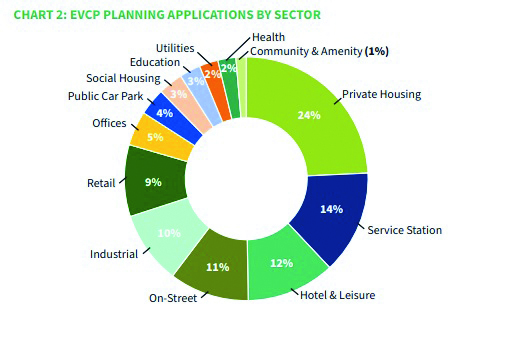NHS trusts will need to accelerate the rollout of electric vehicle (EV) charging points across the estate if they are to meet the Government’s net zero ambitions.
Research by construction industry insight expert, Glenigan, reveals adoption of EV infrastructure within the health sector is lagging behind other markets, with a sizeable deficit of charging points in relation to the number of vehicles currently being manufactured and registered in the UK.
Private housing developments currently comprise the highest proportion of applications – 24% – with healthcare sitting at just 2%, according to the research.
Not only are EV charging points a good way to reduce carbon emissions, but they also help to attract and retain staff at a time when the NHS is facing a recruitment crisis and they improve the patient experience.
In addition, there is the potential to create new revenue streams, such as vehicle-to-grid, which allows EVs to store energy and discharge it back to the electricity grid when needed.
According to Eaton, 51% of NHS trusts currently have EV charging units available, with 43% planning to introduce them over the next five years.
Only 6% of NHS trusts had no plans to introduce them at all, according to the Freedom of Information request.
But 53% of the 142 organisations who responded, said they would need greater electrical capacity, while 41% said they may incur additional energy costs through greater peak demand.
Marc Gaunt, segment lead for commercial buildings at Eaton, said: “Estates and facilities managers often consider building energy first when considering decarbonisation, but travel and transport is a vital consideration.
“NHS trusts are adopting EV charge points rapidly and public and commercial buildings will need to follow suit.”
